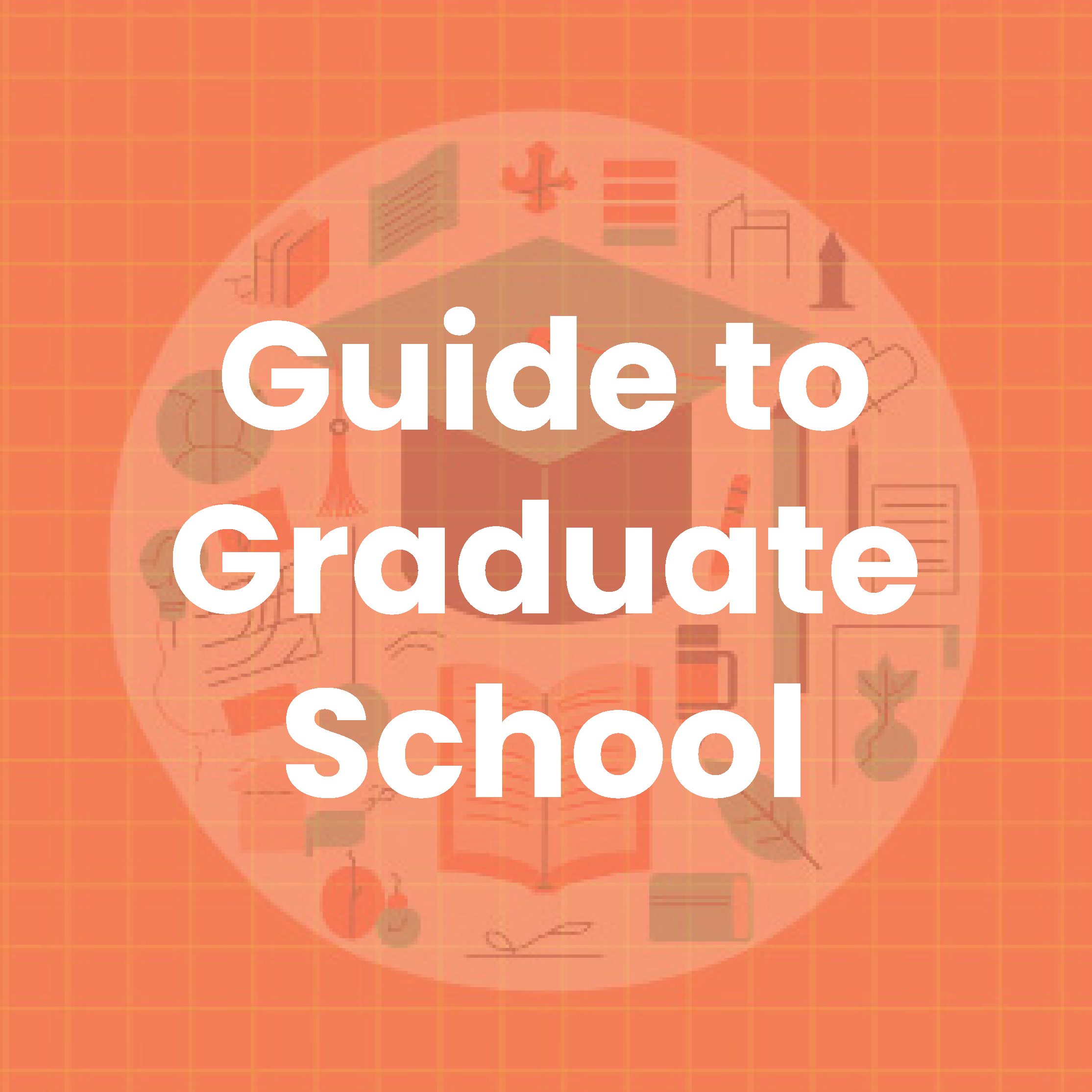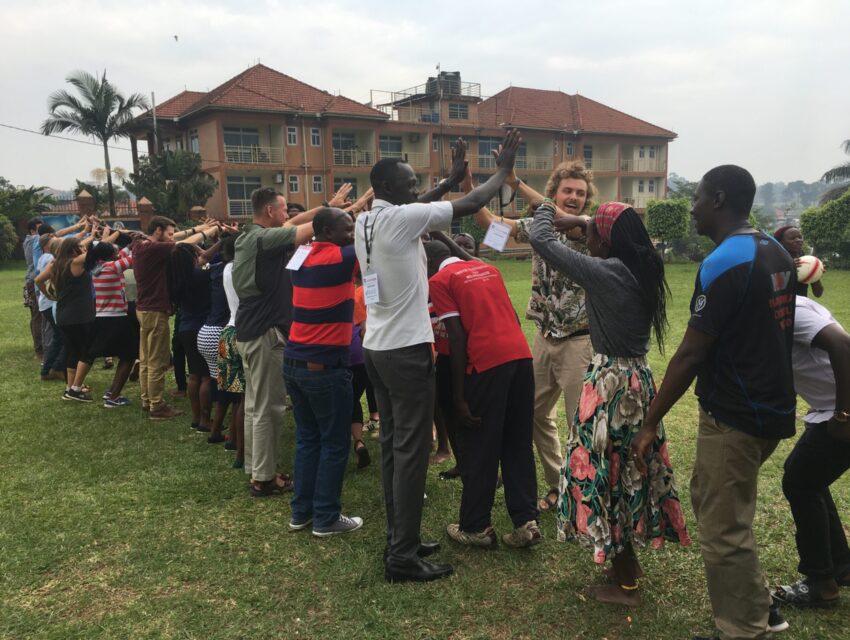
Keep the Pep in PEPFAR
Changes to a critical bipartisan U.S. policy on HIV/AIDS could have devastating consequences worldwide.
From my first week living in Motse Mocha, Quthing District, Lesotho, I heard drums and singing late into the night every Friday. Only after meeting my neighbors and making friends did I understand that the music was for funeral preparations.
After several months I, too, was invited to stay up late, peeling carrots and chopping onions by paraffin lamplight to make food for grieving family and friends gathering for the next day’s burial. Eventually, I lost count of the number of funerals I attended.
When my Peace Corps service began in 2005, nearly one in four people in Lesotho were living with HIV, but lifesaving antiretroviral therapy (ART) was not yet publicly available. Lesotho was losing an entire generation to the virus. I listened as grandfathers eulogized their sons and daughters, asking what was wrong in the universe that the young were dying before the old.
My Peace Corps post was with the National AIDS Commission’s Quthing office, led by Mme Lerato Moeketsi. We promoted HIV prevention and stigma-reduction messages with youth groups. We supported home-based care groups with supplies and income-generating projects to help them care for the sick. And then, on Friday nights, we chopped more onions and sang more songs and, on Saturdays, we attended more burials – sometimes three or four in one day.
In time, public hospitals and clinics began providing ART. The therapy offered hope. Slowly things began to change. My Peace Corps service extended to supporting broad HIV testing campaigns and raising awareness about ART. The pioneering chair of the Quthing Network of Persons Living Openly with HIV, Mme Maphallang, spoke at gatherings, saying, “People who insist they are not sick are the ones dying. But those of us who know we have HIV and are taking care of ourselves, we are living.”
These changes were supported in part by the President’s Emergency Plan for AIDS Relief (PEPFAR). To date, PEPFAR has supported ART for more than 20 million people, enabled 5.5 million HIV-free births, and helped to save over 25 million lives around the globe. Created in 2003 under the George W. Bush administration, PEPFAR has spanned four presidential administrations and 10 Congresses with robust bipartisan support.
Peace Corps and PEPFAR
For the first time in its 20-year history, PEPFAR’s future is now in question. Until 2024, legislative reauthorizations of PEPFAR occurred in five-year increments. But in March 2024, PEPFAR was reauthorized for only a single year. As Peace Corps Volunteers, we know that long-term commitments unlock opportunities for change that are impossible with a short-term mindset. Jirair Ratevosian, PEPFAR’s former chief of staff, has highlighted the fact that the program’s success depends on its ability to establish lasting multiyear partnerships and facilitate true collaborations with government, private sector, and community actors based on mutually agreed-upon goals and trust.
PEPFAR has spanned four presidential administrations and 10 Congresses with robust bipartisan support. In March, it was reauthorized for just a single year.
Since 2003, PEPFAR has augmented Peace Corps Volunteer service in more than 60 countries; it has funded two-year PCV posts, staff positions, Peace Corps Response volunteers, Global Health Service Partnership volunteers, and PCV project support. Tyler Johnson, a Volunteer in Zambia (2014–17), said, “PEPFAR significantly influenced my service by providing my community counterpart and I with the skills and resources to implement HIV prevention in our primary education programs. I also received a PEPFAR small grant to respond to a priority identified in our community—training 20 community members in HIV counseling and testing to increase access at our local health facility.” PEPFAR support has enabled impactful partnerships across Africa, South America, Asia, and the Caribbean. Ilana Cohen, RPCV Malawi (2011–14) and Grassroot Soccer’s director of programs, shared, “Since 2011, Grassroot Soccer (GRS) has partnered with Peace Corps to deliver its sports-based SKILLZ programs in thousands of communities worldwide supported by PEPFAR. PCVs gain access to fun and effective GRS interventions and their work enables GRS to reach young people in areas that otherwise lack such programming.”
PEPFAR is Peace Corps’ most significant external partner; its funding represented 10 percent of the Peace Corps budget in 2021 and subsidizes HIV prevention, care, and support as mainstreamed priorities across all six Peace Corps program sectors. Former Peace Corps Director Aaron Williams affirmed that “one of Peace Corps’ most important and historic partnerships is with PEPFAR, and I have always regarded this relationship as one of our most important engagements during my tenure as Director. We were honored that the Agency received funding and technical support that allowed thousands of Peace Corps Volunteers to work on HIV/AIDS awareness and prevention programs worldwide.”
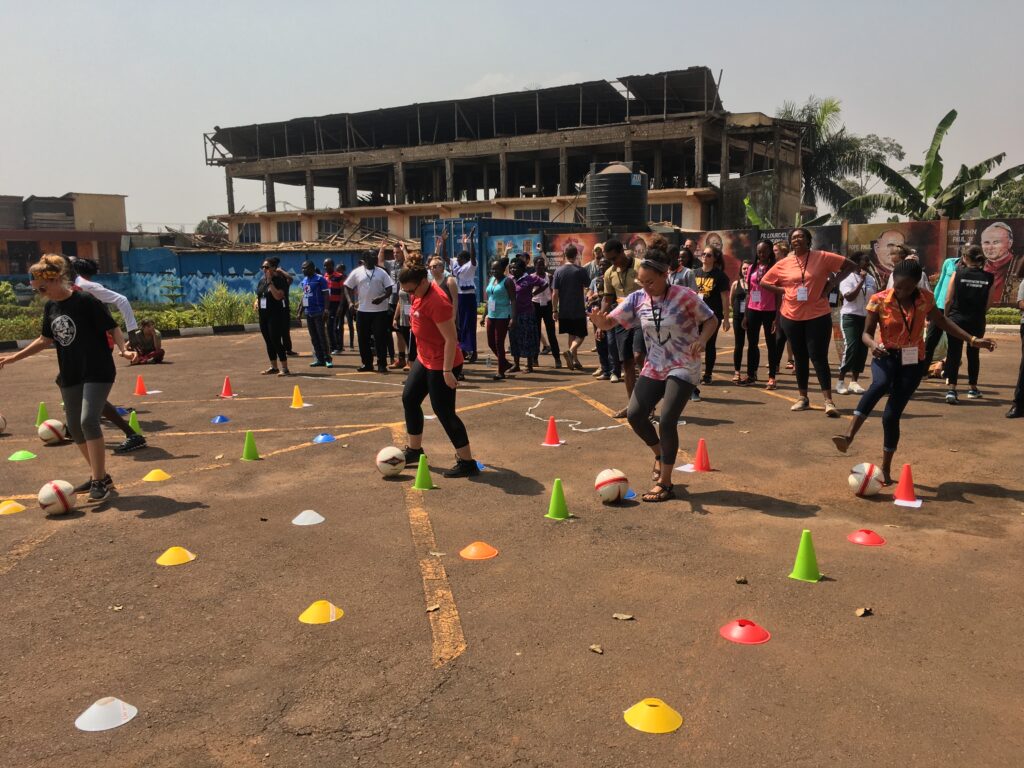
The SKILLZ programs use soccer and other sports to address health issues. Supported by PEPFAR
funding, the group works closely with Peace Corps. (Credit: Grassroot Soccer)
And the work is not done. In 2022, approximately 1.3 million people were infected with HIV, and 630,000 died from HIV-related causes globally. We are on the brink of game-changing advances, such as the implementation of highly effective, long-acting injectable drugs for HIV prevention, and the integration of HIV treatment with holistic health care services, including mental health, violence prevention, cardiovascular care, and cancer prevention. In addition to progress on HIV, PEPFAR funds have led to significant improvements in childhood immunizations, maternal and child health, laboratory and disease surveillance capacity, and the COVID-19 response. Country partners, such as Lawrence Khonyongwa from the Malawi Network of People Living with HIV, have called for continued support for PEPFAR, which Khonyongwa has described as “a lifesaving program like no other.” To end PEPFAR now – or weaken its ability to serve as a long-term, dependable partner – will undercut its gains and forfeit its potential for future success.
PEPFAR needs both parties
The current state of PEPFAR legislation is complicated. PEPFAR’s authorizing legislation established the program and its leadership structures, such as the Office of the U.S. Global AIDS Coordinator, as permanent fixtures under U.S. law. So PEPFAR’s existence does not depend on reauthorization. However, its success does. Some of its provisions will end without reauthorization. PEPFAR also requires legislative support for the appropriation of funds to achieve its mission. Importantly, long-term reauthorization is a signal from the United States of its commitment as a partner in global health.
Renewed five-year funding for PEPFAR was stalled in 2023 when concerns were raised that, as a program related to sexual and reproductive health, PEPFAR may be supporting abortion. However, PEPFAR is prohibited by U.S. law from funding abortion, and Ambassador John Nkengasong, U.S. Global AIDS Coordinator, has affirmed that PEPFAR “has never, will not ever, use [its] platform in supporting abortion.” Furthermore, no evidence has been provided to substantiate these concerns. And, in a September 2023 op-ed for the Washington Post, former President George W. Bush reflected on PEPFAR, saying, “There is no program more pro-life than one that has saved more than 25 million lives.”
To revive PEPFAR’s ability to support long-term planning in partner countries and maintain effective partnerships with organizations that operate on multiyear timelines – such as Peace Corps – it is critical to reestablish the historically strong bipartisan support for PEPFAR.
Call to action
What I’ve written here is part of my story. To support Peace Corps and PEPFAR, you can tell yours. Write to your Congressional representatives (https://www.congress.gov/ members). Take 10 minutes to tell your representatives a story that illustrates the importance of global health. Tell them about the power of long-term partnership. Tell them that PEPFAR is important and ask them to reauthorize it for an additional five years.
Sharing your story with friends and communities can also help, whether at dinner parties, through your own initiatives, or as a part of Returned Peace Corps Volunteer programs such as Global Connections. RPCVs have a proud tradition of fulfilling the Peace Corps’ Third Goal: “To help promote a better understanding of other peoples on the part of Americans.”
Now is the time to act. Less than a year remains to reaffirm PEPFAR’s value and revitalize its historically broad and bipartisan coalition of support. RPCVs span the political spectrum and come from all across the country; by sharing our stories to advocate for the next five-year reauthorization of PEPFAR, we can continue our call to service – and support future Volunteers, Peace Corps staff, counterparts, and part- ner countries in building partnerships and improving lives.
Laura K. Beres (Lesotho 2005–07) is an assistant research professor at the Johns Hopkins Bloomberg School of Public Health. The opinions expressed here are those of the author and do not necessarily reflect the views of Johns Hopkins University. S. Kristjan Selvig (Lesotho 2005–07) made editorial contributions to this story.
Related Articles
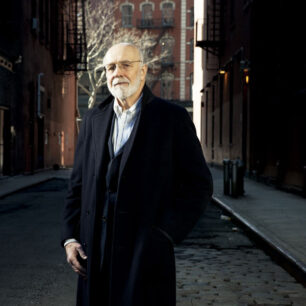
Made in America
Charlie Clifford (Peru 1967–69) is the founder of Tumi Inc., a global travel luggage brand, as well as Roam Luggage.…

“Bigger Than Peace Corps”
California Service Corps is the largest state-based service program in the U.S. , with more than 10,000 volunteers across the…

Signal Boost
The digital world is awash in voices seeking monetary reward or improved social status, as the online acronym goes, IRL…
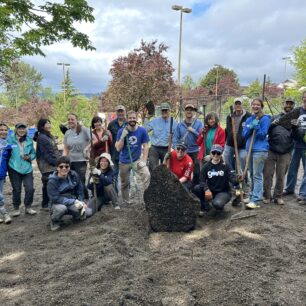
Garden of Refuge
As part of our commitment to continued service, the Seattle Peace Corps Association (SEAPAX) is partnering with World Relief Western…





